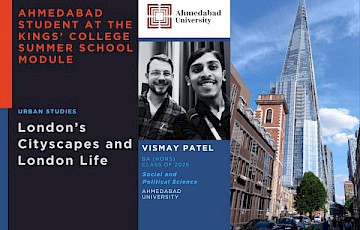14 May 2024
Ahmedabad Research Scholar’s Study on Oral Cancer wins ISEV Scholarship

Targeting miR-1307-5p found inside tiny particles called Extracellular Vesicles (EVs) could be a promising strategy for improving treatment outcomes in oral cancer patients, especially those who are resistant to chemotherapy, suggests the research of Ahmedabad University's Doctoral Candidate Aditi Patel.
Chemo-resistance has emerged as one of the major confounders of Oral Squamous Cell Carcinoma (OSCC) in the Indian sub-continent. OSCC is a type of cancer that starts in the squamous cells lining the mouth and throat. This necessitates the isolation of non-invasive and effective biomarkers to identify patients at risk of chemo-resistance. In this study, Aditi has identified the clinical relevance of a novel Extracellular Vesicle (EV) encapsulated miRNA and unravelled its underlying mechanism responsible for the development of chemo-resistance in OSCC.
Aditi's study highlights exclusive upregulation of miR-1307-5p in the saliva of patients with oral cancer who did not respond well to chemotherapy or had relapses of cancer. Further monitoring also showed a decrease in levels of miR-1307-5p levels in chemo-responders, while non-responders and relapse patients experienced a corresponding increase. EVs derived from the supernatant of anti-miR-1307-5p transduced CD44+ cells hindered the proliferation, migration, and invasion of Cancer Stem Cells (CSCs).
Furthermore, EVs hindered tube formation in human umbilical vein endothelial cells, and the Chick Chorioallantoic Membrane (CAM) assay validated their ability to inhibit micro-vascular formation. Combinatorial treatment of supernatant-derived EVs and chemotherapy drug cisplatin on CD44+ cells resulted in a 69.23 per cent reduction in cancer cell growth. The study also demonstrated that when injected into the buccal cavity of SCID mice, supernatant-derived EVs showed a reduction in tumour growth and metastatic potential. Based on her research, Aditi’s study proposes EV-derived miR-1307 as a candidate biomarker for predicting and monitoring the chemotherapeutic response and as a potential target to reverse drug resistance.
Aditi has won a scholarship for her study at the esteemed International Society for Extracellular Vesicles (ISEV) 2024 Conference. ISEV is the largest community of extracellular vesicle researchers in the world. "My primary goal is to pursue further research where I can deepen my understanding and contribute to cancer research. I intend to collaborate with faculty, engage in cutting-edge research projects, and actively participate in the academic community through seminars, workshops, and networking events to broaden my perspectives and opportunities. With these, I hope to advance my knowledge, contribute to the University's vibrant research environment, and impact society," said Aditi.



